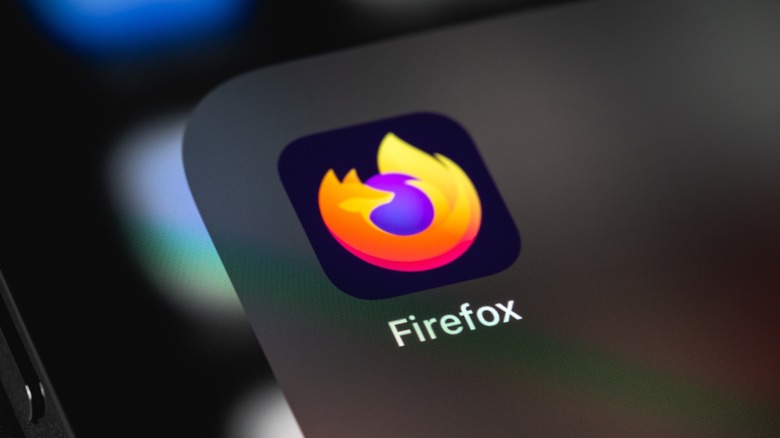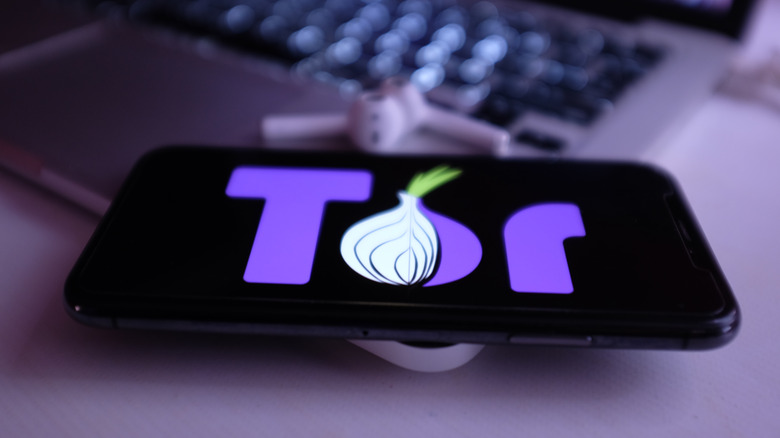The Best Google Chrome Alternatives For Android
According to Statista, 59.72% of users access the internet from their mobile devices, and in 2021, there were almost 5 billion active mobile internet users across the globe. These figures indicate one thing: we are more inclined to surf the web from our phones, making browsers a staple for every mobile device. In fact, the apps are opened so frequently that most phones already come with built-in browsers, so you don't have to bother installing one. For Android users, that's most likely Google Chrome.
While it's a great app, Chrome lacks some functionalities other browsers offer. It has no built-in VPN, interface customization, or even extension support. If you're on the hunt for these features, try looking for other browsers on Play Store that are better suited for your needs. There are dozens of options out there, and here are five of the top Google Chrome alternatives you might want to check out.
Firefox
Firefox is easily one of the best Android browsers in 2022, evidenced by over 100 million downloads and 4.69 million reviews on Google Play Store. What makes it a top option is its emphasis on privacy. This has been its top priority ever since version one in the early 2000s.
In fact, it's such a champion for privacy that the first thing you'll see when you install the app is an option to set the Always-on Privacy to Strict instead of Standard. This blocks no less than 2000 third-party tracking cookies, cypto mining scripts, and social trackers from accessing your precious data, something that Chrome is yet to add to its app (via Mozilla). Firefox mobile also comes complete with built-in add-ons, unlike Chrome whose mobile app doesn't support extensions.
A downside that users hate about the app, though, is that it sometimes feels slow and has trouble reloading a page. The add-ons are also pretty limited.
Vivaldi
Although Vivaldi is based on the open-source Chromium code just like Google Chrome, it offers an entirely different experience. For starters, Vivaldi comes with a unique look and customization, which lets you lets you change how web pages look. You have a two-level tab stack for a seamless browsing experience, an option to position your tab and address bar either at the top or bottom and the ability to pick between themes and light or dark modes.
There is also a ton of features users can enjoy. The first is the easy switch between different search engines just by clicking the search bar. You can also find useful tools within the browser itself, including a Notes tab, QR code scanner, private translator, and full-page screen capture. If you get bored browsing, there's an arcade game you can switch to right in the app. Vivaldi is packed with plenty more features, so if you prefer a minimalist browser, this may not be for you.
Brave
Having only launched version 1.0 in late 2019, Brave is fairly new. In spite of this, its unique features have attracted so many users that it now has over 100 million downloads on Google Play Store. Among the highlights of the app are the built-in VPN that works on top of its tracker and the ad blocker that doubles down on your privacy while browsing online. It also has its own crypto-wallet, Brave Wallet, where you can store and track your crypto assets.
Another thing that makes Brave stand out from its competitors is its unique way of handling targeted ads. Instead of bombarding you, Brave actually lets you decide whether to view or block them. If you opt to view Brave Private Ads, you can earn Basic Attention Tokens (or "BAT") that you can use for redeeming rewards or anonymously supporting your favorite websites. Additionally, you can decide how many ads Brave sends your way per hour. You can have as few as one or as many as ten.
These rich features make Brave a great browser, but unfortunately, the eat up a lot of your space. It's 224 MB, a massive leap compared to Chrome's 18 MB. So if you want to have it installed on your phone, you need to make room for it.
Tor
Every mobile browser has some sort of privacy feature up its sleeves, but Tor takes the game up a notch. Initially released last 2018, Tor comes with all sorts of privacy tricks to let you browse the internet freely and safely. At the top of the list is multi-layered encryption. This encrypts your traffic three times using the volunteer-run Tor network, allowing you to remain anonymous as you surf the web.
The mobile browser also blocks third-party trackers and pesky ads, hides precious data from people watching your connection, and lets you access sites originally blocked by your local internet service. Apart from these nifty features, the browser's interface looks clean and minimal, unlike other mobile browsers with cluttered home pages.
Tor is undoubtedly a great app for safeguarding yourself while on the internet, but such privacy comes with a price. Pages usually load slower on Tor despite high-speed connectivity, and websites needing verification can fail at times. So if you're using your mobile browser every day, you might consider other apps.
Opera
Having been around for almost three decades, Opera has garnered quite the following, and it's easy to see why. The browser comes complete with a native ad blocker that not only stops ads from following you around but also gets rid of most cookie and privacy dialogs. Another note-worthy feature is the built-in VPN, letting you increase your anonymity online without having to download a separate app. Additionally, Opera has a data-saving feature that most mobile browsers lack. This is very useful for speeding up your browsing experience when on a limited data plan or slow internet connection.
Despite these decent features, a downside that users see in Opera is the limited external apps it automatically opens via links. For instance, when you click on a YouTube link, the browser opens your YouTube app (if you have it installed), but this doesn't work on banking apps. Some users also experience frequent lags on the app.





